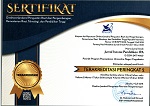Gerakan Kewarganegaraan Ekologis sebagai upaya Pembentukan Karakter Peduli Lingkungan
Abstract
Keywords
Full Text:
PDFReferences
Aditjondro, G. J. (2003). Pola-Pola Gerakan Lingkungan: Refleksi Untuk Menyelamatkan Lingkungan Dari Ekspansi Modal. Yogyakarta: Pustaka Pelajar.
Anantharaman, M. (2014). Networked Ecological Citizenship, The New Middle Classes and The Provisioning of Sustainable Waste Management in Bangalore, India. Journal of Cleaner Production, 63, 173-183.
Antwi, et. Al,. (2014). Land cover transformation in two post-mining landscapes subjected to different ages of reclamation since dumping of spoils. SpringerPlus, 3, 702, 1-22.
Asshiddiqie, J. (2009). Green Constitution Nuansa Hijau Undang-Undang Dasar Negara Republik Indonisia tahun 1945. Jakarta: Rajawali Pers.
Awaliyah, S., Al Atok, R., & Wulandari, N. A. T. (2018). The Implementation of Regulation of the Minister of Education and Culture Number 23 Year 2015 Concerning Character Development in the Middle School. 251(23), 367–370. https://doi.org/10.2991/acec-18.2018.84
Bozek, J. (2011). “Tree Day” educational programme. dalam, The Civic Inspirer A Guide To Informal Civic Education At (And Not Only) Public Librarie. The Foundation Institute of Public Affairs. Poland.
BPS. (2018). Statistik Daerah Provinsi Kepulauan Bangka Belitung 2018. BPS Provinsi Kepulauan Bangka Belitung.
Chavez, M. (2018). The News Media and Environmental Challenges in Mexico: The Structural Deficits in The Coverage and Reporting by The Press. Chapter 2. 19-44.
Creswell, J.W. (2015). Research Design: Pendekatan Kualitatif, Kuantitatif, dan Mixed. Yogyakarta: Pustaka Pelajar. Edisi ketiga.
DLH. (2017). Renstra Strategis Dinas Lingkungan Hidup 2017 – 2022 Provinsi Kepulauan Bangka Belitung
Ghosh, S. (2015). Learning From Community: Agenda For Citizenship Education. Education, Citizenship and Social Justice. 10 (1), 21–36.
Gunanti, D. (2012). Meranap Pembelajaran Pendidikan Lingkungan Hidup dalam Konfigurasi Pendidikan Kewarganegaraan. PKn progresif, 7 (2). 140-151.
Humphreys, D. (2009). Environmental and Ecological Citizenship in Civil Society. The international spectator,
(1), 171–183.
Irawan, R.R. (2014). Stakeholder Management: Conflict and Interest in Tin Mining Industry Indonesia (Case study Bangka Belitung province). European Scientific Journal. 10 (25). 75-89.
Jagers., et al. (2014). Ecological Citizenship: A Driver of Pro-Environmental Behaviour?. Environmental Politics, 23 (3), 434–453.
Kalidjernih, F. K, (2011). Puspa Ragam Konsep dan Isu Kewarganegaraan. Bandung: Widya Aksara Press. Edisi ketiga.
Kennedy, E. H. (2011). Rethinking Ecological Citizenship: The Role of Neighbourhood Networks In Cultural Change. Environmental Politics, 20 (6), 843–860.
Keraf, A.S. (2014). Filsafat Lingkungan Hidup: Alam Sebagai Sebuah Sistem Kehidupan Bersama Fritjof Capta. Yogyakarta: Penerbit PT Kanisius.
Keulartz, J. (2018). Does Deliberation Promote Ecological Citizenship? The Convergence Hypothesis and the Reality of Polarization. Dalam.
S. Sarkar and B. A. Minteer (eds.). A Sustainable Philosophy The Work of Bryan Norton, The International Library of Environmental, Agricultural and Food Ethics.
Laporan Tahunan PT Timah Tbk. (2017). Togetherness for better future. Latchem, C. (2018). Open and distance non-formal education in developing countries. Springer: Singapore.
Latta, X., & Wittman, H. (2014). Ecological Citizenship in Latin America. dalam E. Isin and P. Nyers (eds), The Routledge Handbook of Global Citizenship Studies. London: Routledge, 265-273.
Murdiantum & Daryanto. (2015). Pengelolaan kesehatan lingkungan. Yogyakarta: Penerbit Gava Media.
Nomura, K. (2009). Democratization and the politics of environmental claimmaking. South East Asia Research, 17 (2), 261–285.
Nurmayanti, I., & Harmanto. (2017). Strategi yayasan mangrove center tuban dalam mengembangkan ecological citizenship pada masyarakat tuban. Jurnal kajian moral dan kewarganegaraan, 5 (2), 83-97.
Peeples, J. (2015). Discourse/Rhetorical Analysis Approaches to Environment, Media, And Communication’’. dalam. Anders Hansen & Robert Cox. The routledge handbook of environment and communication. London and New York: Routledge.
Prasetiyo, W.H. & Budimansyah, D. (2016). Warga Negara dan Ekologi: Studi Kasus Pengembangan Warga Negara Peduli Lingkungan dalam Komunitas Bandung Berkebun. Jurnal pendidikan humaniora, 4 (4), 177-186.
Renthlei, L. (2016). Governance and Environmental Protection in Mizoram. Indian Journal of Public Administration, 62 (3), 645–656.
Report UNDP-UNEP. (2015). Climate Public Expenditure Andinstitutional Review Of Bangkabelitung Island Of Indonesia. Center for Climate Finance and Multilateral PolicyFiscal Policy AgencyMinistry of Finance, Republic of Indonesia
Samsuri. (2011). Pendidikan Kewarganegaraan Sebagai Wahana Membangun Karakter Warga Negara Demokratis. dalam Pendidikan karakter dalam perspektif teori dan praktek, 356-383. Yogyakarta: UNY Press.
Shin, S. (2015). Environmental Policy in East Asia Institutions in Comparative Perspective. Dalam. Routledge Handbook of Environment and Society in Asia. London and New York: Routledge.
Singh, P.K. et al. (2017). A New Model of Exact Reclamation of Post-mining Land to Address Land Acquisition Problem in Indian Coal Mining Industry. Journal Geological Society Of India, 89, 307-314.
Smith, M.J. & Pangsapa, P. (2008). Environment and Citizenship Integrating Justice, Responsibility and Civic Engagement. London: Zed Books.
Syahri, M. (2013). Bentuk-Bentuk Partisipasi Warga Negara dalam Pelestarian Lingkungan Hidup Berdasarkan Konsep Green Moral di Kabupaten Blitar. Jurnal Penelitian Pendidikan, 13 (2), 119-134. The
Danish Egyptian Dialogue Institute. (2016). The Road to Citizenship Education in Egypt.
Toumbourou, T. (2011). Asia-Pacific. Alternative Law Journal, 36 (1), 54–55.
UNEP & CAEC. (2014). Enforcement of Environmental Law: Good Practices from Africa, Central Asia, ASEAN Countries and china. Beijing. China.
Vasi, I.B. (2011). WINDS OF CHANGE The Environmental Movement and the Global Development of the Wind Energy Industry. New York: Oxford University Press.
DOI: http://dx.doi.org/10.17977/um019v4i2p381-391
Refbacks
- There are currently no refbacks.
Copyright (c) 2020 Jurnal Ilmiah Pendidikan Pancasila dan Kewarganegaraan

This work is licensed under a Creative Commons Attribution 4.0 International License.
View My Stats










